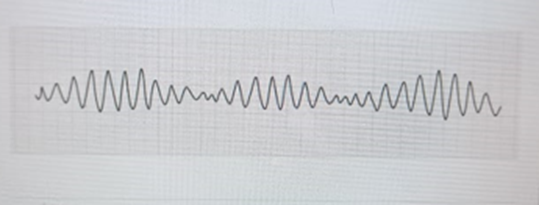Which lab value would be most likely to cause the following dysrhythmia?

Ca 12
Mag 3.1
K+ 2.6
Mag 1.1
The Correct Answer is D
A. Hypercalcemia (Calcium > 10.5 mg/dL) can lead to shortened QT intervals, not prolonged ones, and is unlikely to cause Torsades de Pointes.
B. A magnesium level of 3.1 mEq/L is slightly elevated and would not contribute to QT prolongation or Torsades de Pointes. In fact, magnesium supplementation is a treatment for this condition.
C. Hypokalemia (Potassium < 3.5 mEq/L) can prolong the QT interval and contribute to dysrhythmias, but it is less commonly a direct cause of Torsades de Pointes compared to hypomagnesemia. A potassium level of 2.6 mEq/L is low but would not typically result in Torsades without coexisting hypomagnesemia.
D. Hypomagnesemia (Magnesium < 1.5 mEq/L) disrupts the heart's electrical activity, prolonging the QT interval and increasing the risk of polymorphic ventricular tachycardia, like Torsades de Pointes. Magnesium is critical for stabilizing myocardial electrical conduction, and a value of 1.1 mEq/L indicates significant deficiency, consistent with this dysrhythmia.
Nursing Test Bank
Naxlex Comprehensive Predictor Exams
Related Questions
Correct Answer is C
Explanation
A. Pouring water over the genitals can help reduce the pain of urination, which is common in clients with genital herpes.
B. Washing hands carefully after applying ointment is important to prevent the spread of the virus.
C. The herpes simplex virus can be transmitted even when lesions are not present, so this statement indicates a need for further education. The virus can be spread through asymptomatic viral shedding.
D. Increasing fluid intake when lesions are open helps to prevent urinary retention and promote healing.
Correct Answer is B
Explanation
A. Adenosine 6 mg IV push: Adenosine is used for certain supraventricular tachycardias, but immediate cardioversion is the first priority for a client with atrial flutter and chest pain.
B. Immediate cardioversion: This is the correct answer. Immediate cardioversion is indicated for atrial flutter with signs of hemodynamic instability, such as chest pain and shortness of breath.
C. Adenosine 12 mg IV push: Adenosine may be used after the first dose of 6 mg if the initial dose was ineffective, but cardioversion takes precedence for unstable patients.
D. Amiodarone 150 mg bolus followed by a 24-hour drip: Amiodarone is an antiarrhythmic used for rate control or rhythm conversion but is not the first step for hemodynamically unstable clients with atrial flutter.
Whether you are a student looking to ace your exams or a practicing nurse seeking to enhance your expertise , our nursing education contents will empower you with the confidence and competence to make a difference in the lives of patients and become a respected leader in the healthcare field.
Visit Naxlex, invest in your future and unlock endless possibilities with our unparalleled nursing education contents today
Report Wrong Answer on the Current Question
Do you disagree with the answer? If yes, what is your expected answer? Explain.
Kindly be descriptive with the issue you are facing.
